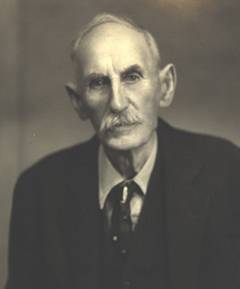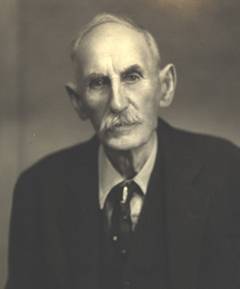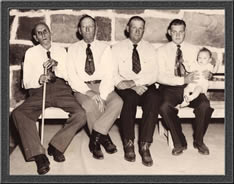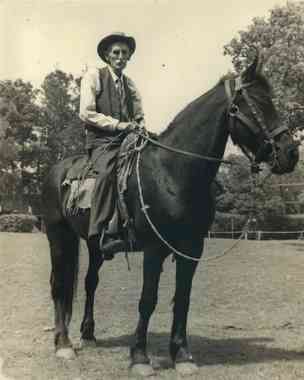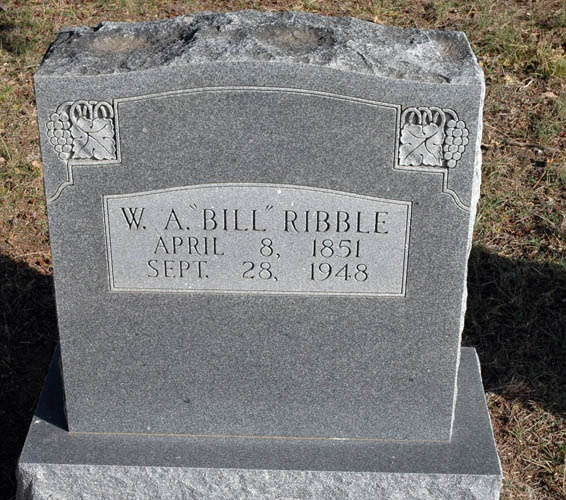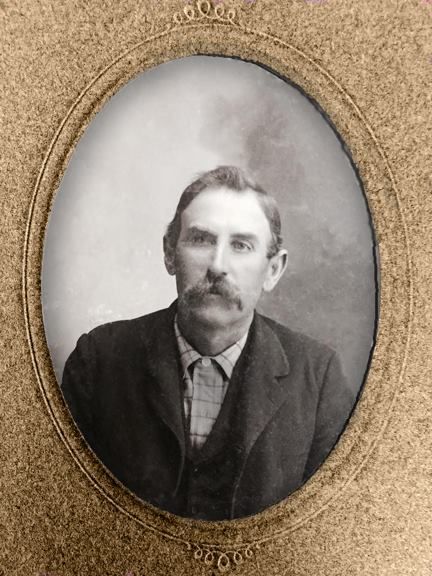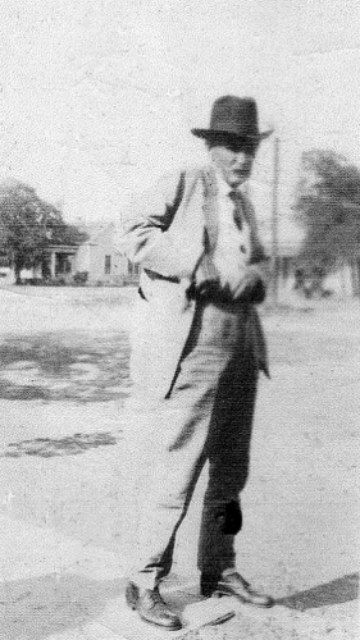In 1855 John Ribble brought a consignment of flour to the government agents at the Brazos River Indian Reservation. John decided that area would be a good place to settle and build a gristmill. John built a double log cabin on some land on Rock Creek, which is a tributary of the Brazos River, and it was close to the reservation. When Jack County was established his log cabin was in Jack County and his adjoining lands were in Young and Palo Pinto County. In building his home on Rock Creek, it became the first log cabin in Jack County, Jack County history does state that the Ribble cabin was the first built in Jack County; however, another man built a cabin after John, but moved his family in immediately. Hence Jack County gives him credit for having the first residence there. After John finished the cabin he went back to Honey Grove to move his family to Rock Creek in April 1856.
Just a few weeks later, in July 1856, John Ribble went back to Honey Grove to bring his father, Joseph Ribble, to their new home. He found his father ill with typhoid fever, and while attending him contracted the disease himself. Joseph Ribble died, and fourteen days later his son succumbed to the disease. At that time there was no mail service, all messages having to be sent by people passing, and it was a month before Mrs. John Ribble (Susan) knew of her husband's death. Susan decided to stay on Rock Creek. She was an independent strong woman to raise children in that sparsely populated area which was still experiencing Indian troubles. The Ribbles moved to Parker County temporarily when there was turmoil with the Indians and white men posing as Indians.
In later years Bill recalled many interesting and some amusing incidents. There was a Caddo Indian on the Brazos River Indian Reservation known as "Scabnose John" because he always had a patch on his nose. One cold day Scabnose, who had been indulging in "firewater", rode up to the Ribble home. He went over to the chimney and said, "Fire, fire", whereupon Harvey Ribble invited him to come into the house and warm. When he came in the boys noticed that the Indian had the hiccoughs, but that was soon cured. Pulling a butcher knife from his belt, Scabnose strode over to the fireplace, cut apiece off a coal of fire, tossed it in his mouth and chewed it up. It stopped his hiccoughs. Soon he mounted his horse and rode away, without bothering anything.
When Susan heard of the massacre, she loaded her wagon and took the children to Betty Prairie, about five miles northwest of Mineral Wells. They stayed there during the summer, and then moved up to Keechi, the other side of Graford, in Palo Pinto County, where they spent the winter. The following spring they returned to their Rock Creek home.
It was during this same spring, 1859, that the first stage line from Weatherford to Fort Belknap was started. The contract for the stage line was let to a man named Duckworth, and the first stage drivers were Ike Smith and Jack Simpson. They stopped at the Ribble home to eat dinner and change horses, and changed horses again at the Oliver Loving ranch.
In 1859 his mother married Jacob Cross, Sr. They had one child, Jake Cross, before they separated for the rest of their lives.
Gradually the railroad came nearer, with terminals successively at Calvert, Bremond, Waxahachie, and Dallas. In December, 1872, Bill Ribble went to Shreveport with some cattle, and on his way home was in Dallas when the first train came in there.
In 1873 Bill Ribble came to Young County and took up a claim on the old Indian reservation, then went back for his bride. He was married to Miss Annie Davidson of Hood County on November 13, 1873, and soon afterward they moved to his claim, arriving on February 11, 1874. Driving a yoke of oxen, they had their wagon half full of corn, with their furniture on top. They went to housekeeping with three chairs, a table, a feather bed, and quilts that his mother had given them. With the help of two old friends from Parker County, John and George Fore, they built a log cabin, using round poles for rafters and spilt poles for lathing. As of 2014 the log cabin was still standing.
Bill and Annie welcomed their first child, Ed Ribble, born on July 18, 1874. Sorrow came to the Ribble home when his wife, Annie Davidson Ribble, was claimed by death during childbirth on November 22, 1876, both Annie and the baby died and both are buried in Gooseneck Cemetery. She left two year old son, Eddie. Two years later Bill was married to Miss Nannie Kutch on September 16, 1878. They had 4 children: Ora Ribble Jarnagin, born January 28, 1880; Horace Lafayette Ribble, born December 12, 1882; Josephine Ribble Caldwell, born October 11, 1886; and Della Ribble Bigham, born September 23, 1888.
Nannie Kutch Ribble died on April 9, 1917, of complications from gall bladder surgery. She is buried at Gooseneck Cemetery in the family section along with his first wife, Annie Davidson Ribble. On June 20, 1920, Mr. Ribble was married to Mrs. Nannie Carter and she passed away July 7, 1947.
At the age of 97, Bill Ribble died on September 28, 1948. He is buried alongside his first two wives in the family plot at Gooseneck Cemetery.
Source is from Carrie Crouch's "A History of Young County" and the works of Maurie Jarnagin Taylor.
In 1855 John Ribble brought a consignment of flour to the government agents at the Brazos River Indian Reservation. John decided that area would be a good place to settle and build a gristmill. John built a double log cabin on some land on Rock Creek, which is a tributary of the Brazos River, and it was close to the reservation. When Jack County was established his log cabin was in Jack County and his adjoining lands were in Young and Palo Pinto County. In building his home on Rock Creek, it became the first log cabin in Jack County, Jack County history does state that the Ribble cabin was the first built in Jack County; however, another man built a cabin after John, but moved his family in immediately. Hence Jack County gives him credit for having the first residence there. After John finished the cabin he went back to Honey Grove to move his family to Rock Creek in April 1856.
Just a few weeks later, in July 1856, John Ribble went back to Honey Grove to bring his father, Joseph Ribble, to their new home. He found his father ill with typhoid fever, and while attending him contracted the disease himself. Joseph Ribble died, and fourteen days later his son succumbed to the disease. At that time there was no mail service, all messages having to be sent by people passing, and it was a month before Mrs. John Ribble (Susan) knew of her husband's death. Susan decided to stay on Rock Creek. She was an independent strong woman to raise children in that sparsely populated area which was still experiencing Indian troubles. The Ribbles moved to Parker County temporarily when there was turmoil with the Indians and white men posing as Indians.
In later years Bill recalled many interesting and some amusing incidents. There was a Caddo Indian on the Brazos River Indian Reservation known as "Scabnose John" because he always had a patch on his nose. One cold day Scabnose, who had been indulging in "firewater", rode up to the Ribble home. He went over to the chimney and said, "Fire, fire", whereupon Harvey Ribble invited him to come into the house and warm. When he came in the boys noticed that the Indian had the hiccoughs, but that was soon cured. Pulling a butcher knife from his belt, Scabnose strode over to the fireplace, cut apiece off a coal of fire, tossed it in his mouth and chewed it up. It stopped his hiccoughs. Soon he mounted his horse and rode away, without bothering anything.
When Susan heard of the massacre, she loaded her wagon and took the children to Betty Prairie, about five miles northwest of Mineral Wells. They stayed there during the summer, and then moved up to Keechi, the other side of Graford, in Palo Pinto County, where they spent the winter. The following spring they returned to their Rock Creek home.
It was during this same spring, 1859, that the first stage line from Weatherford to Fort Belknap was started. The contract for the stage line was let to a man named Duckworth, and the first stage drivers were Ike Smith and Jack Simpson. They stopped at the Ribble home to eat dinner and change horses, and changed horses again at the Oliver Loving ranch.
In 1859 his mother married Jacob Cross, Sr. They had one child, Jake Cross, before they separated for the rest of their lives.
Gradually the railroad came nearer, with terminals successively at Calvert, Bremond, Waxahachie, and Dallas. In December, 1872, Bill Ribble went to Shreveport with some cattle, and on his way home was in Dallas when the first train came in there.
In 1873 Bill Ribble came to Young County and took up a claim on the old Indian reservation, then went back for his bride. He was married to Miss Annie Davidson of Hood County on November 13, 1873, and soon afterward they moved to his claim, arriving on February 11, 1874. Driving a yoke of oxen, they had their wagon half full of corn, with their furniture on top. They went to housekeeping with three chairs, a table, a feather bed, and quilts that his mother had given them. With the help of two old friends from Parker County, John and George Fore, they built a log cabin, using round poles for rafters and spilt poles for lathing. As of 2014 the log cabin was still standing.
Bill and Annie welcomed their first child, Ed Ribble, born on July 18, 1874. Sorrow came to the Ribble home when his wife, Annie Davidson Ribble, was claimed by death during childbirth on November 22, 1876, both Annie and the baby died and both are buried in Gooseneck Cemetery. She left two year old son, Eddie. Two years later Bill was married to Miss Nannie Kutch on September 16, 1878. They had 4 children: Ora Ribble Jarnagin, born January 28, 1880; Horace Lafayette Ribble, born December 12, 1882; Josephine Ribble Caldwell, born October 11, 1886; and Della Ribble Bigham, born September 23, 1888.
Nannie Kutch Ribble died on April 9, 1917, of complications from gall bladder surgery. She is buried at Gooseneck Cemetery in the family section along with his first wife, Annie Davidson Ribble. On June 20, 1920, Mr. Ribble was married to Mrs. Nannie Carter and she passed away July 7, 1947.
At the age of 97, Bill Ribble died on September 28, 1948. He is buried alongside his first two wives in the family plot at Gooseneck Cemetery.
Source is from Carrie Crouch's "A History of Young County" and the works of Maurie Jarnagin Taylor.
